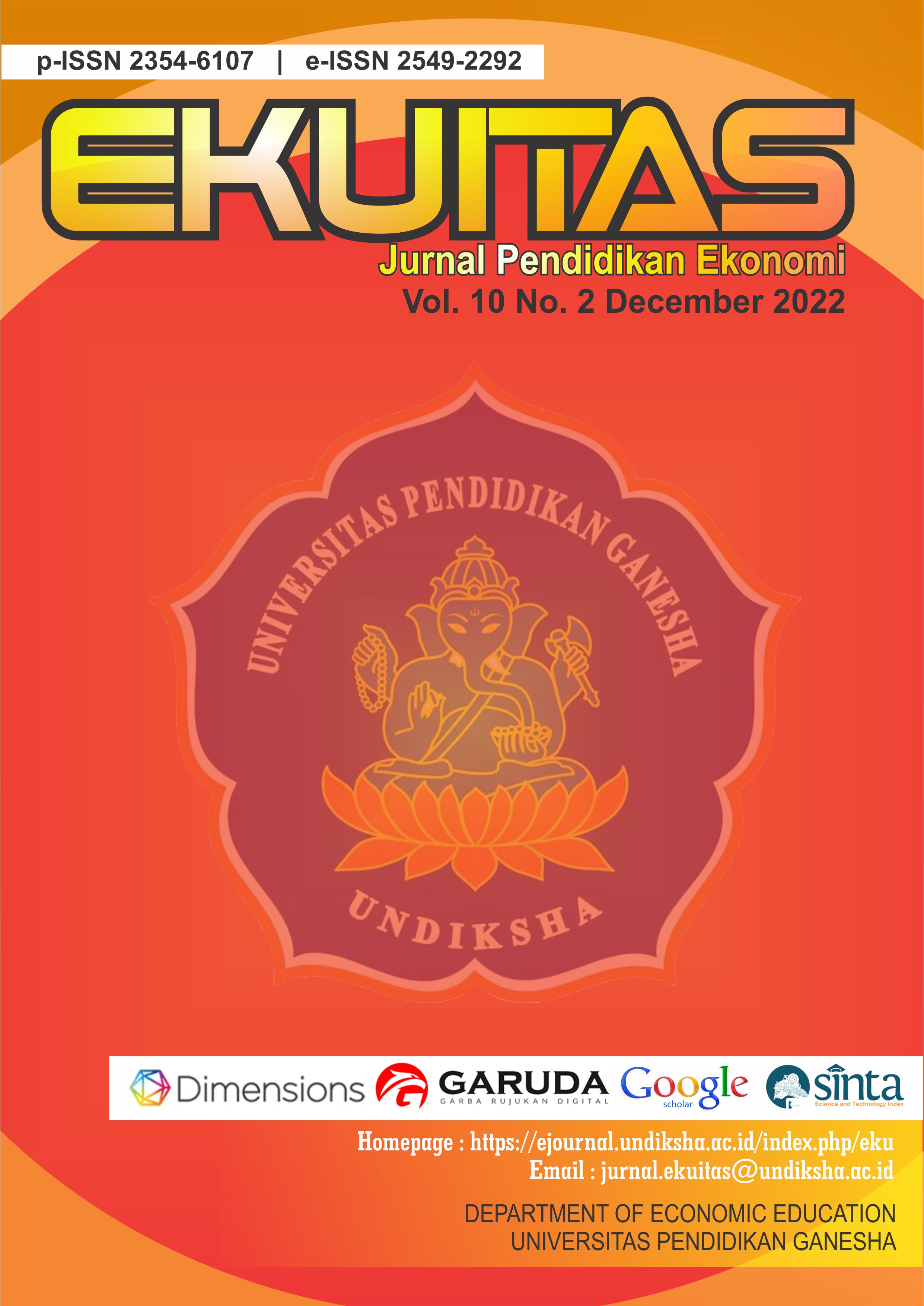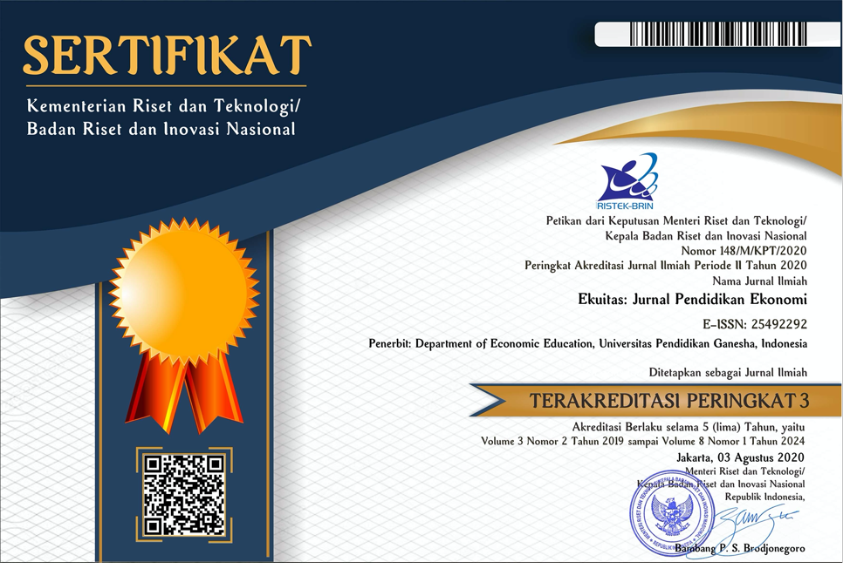Maintain the Economic Activity of Subak in Social and Environmental Transformation
DOI:
https://doi.org/10.23887/ekuitas.v10i2.55169Keywords:
Sustainable economy, social capital, traditional irrigationAbstract
This study aimed to determine the effect of economic sustainability and social capital on the sustainability of traditional irrigation management in Bali. This quantitative research method uses primary data obtained from questionnaire data and measured by a Likert scale. The population of this study was 2,726 subak members in the province of Bali, and the research sample obtained a sample of 348 people. Questionnaires, as research data were collected and distributed to each member of the subak and statistical or data analysis techniques in the study, were considered using the Structural Equation Model (SEM) with WarpPLS 7.0 software modeling. The results of this study indicate that economic sustainability and social capital have a positive and significant impact on the sustainability of traditional irrigation management in Bali.
References
Casciarri, B., & Aken, M. Van. (2013). Anthropologie et eau (x) affaires globales, eaux locales et flux de cultures. Journal Des Anthropologues. Association Française Des Anthropologues, 132(133), 15–44.
Dinas Kebudayaan Provinsi Bali. (2018). 2.726 Subak Berusaha Bertahan. Nusabali.
Huang, H. (2019). Nature and the Spirit: Ritual, Environment, and the Subak in Bali. EnviroLab Asia, 3(2), 1–23.
Hutasoit, H., & Wau, R. (2017). Menuju Sustainability dengan Tri Hita Karana (Sebuah Studi Interpretif Pada Masyarakat Bali). Business Management Journal, 13(2), 1–10.
Khoshnava, S. M., Rostami, R., Zin, R. M., Štreimikiene, D., Yousefpour, A., Strielkowski, W., & Mardani, A. (2019). Aligning the Criteria of Green Economy (GE) and Sustainable Development Goals (SDGs) to Implement Sustainable Development. Sustainability, 11(4615), 1–23. https://doi.org/10.3390/su11174615
Kock, N. (2015). WarpPLS 5.0 User Manual. Laredo, TX: ScriptWarp Systems, Texas, USA.
Kurnia, G., Setiawan, I., Tridakusumah, A. C., Jaelani, G., Heryanto, M. A., & Nugraha, A. (2022). Local Wisdom for Ensuring Agriculture Sustainability: A Case from Indonesia. Sustainability, 14(8823), 1. https://doi.org/10.3390/ su14148823
Limpo, S. Y., Fahmid, I. M., Fattah, A., Rauf, A. W., Surmaini, E., Syahbuddin, H., & Andri, K. B. (2022). Integrating Indigenous and Scientific Knowledge for Decision Making of Rice Farming in South Sulawesi, Indonesia. Sustainability, 14(5), 1–23. https://doi.org/10.3390/su14052952
Mikhno, I., Koval, V., Shvets, G., Garmatiuk, O., & Tamošiūnienė, R. (2021). GREEN ECONOMY IN SUSTAINABLE DEVELOPMENT AND IMPROVEMENT OF RESOURCE EFFICIENCY. CENTRAL EUROPEAN BUSINESS REVIEW, 10(1), 9–113. https://doi.org/10.18267/j.cebr.252
Nerawati, N. G. A. A. (2020). Implementation Of Tri Hita Karana Teachings In Subak Activities In Bali. Jurnal
Penelitian Agama Hindu, 4(2), 133–140.
Norken, I. N., Suputra, I. K., Arsana, I. G. N. K., & Ngurah, I. (2017). Institutional and Regulatory Roles in Maintaining Sustainability of Subak as a World Cultural Heritage in Bali. Asian Agri-History, 21(4), 245–254.
Purnamawati, I. G. A., Jie, F., & Hatane, S. E. (2022). Cultural Change Shapes the Sustainable Development of Religious Ecotourism Villages in Bali, Indonesia. Sustainability, 14(12), 1–15. https://doi.org/10.3390/su14127368
Purnamawati, I. G. A., Yuniarta, G. A., & Wahyuni, N. K. S. (2022). The Role Analysis of the Physical Environment, Socio-Economic, and the Urgency of Tat Tvam Asi in Collective Resource Management Multicultural Subak. Asia-Pacific Management and Business Application, 11(1), 19–36. https://doi.org/10.21776/ub.apmba.2022.011.01.2
Rahmi, D. H., & Setiawan, B. (2020). Pressures on the Balinese world cultural landscape heritage: The case of Jatiluwih Subak Village. IOP Conf. Series: Earth and Environmental Science, 501, 1–9. https://doi.org/10.1088/1755-1315/501/1/012032
Risna, R. A., Rustini, H. A., Herry, Buchori, D., & Pribadi, D. O. (2020). Subak, a Nature-based Solutions Evidence from Indonesia. IOP Conf. Series: Earth and Environmental Science, 959(012030), 1–13. https://doi.org/10.1088/1755-1315/959/1/012030
Sanica, I. G., Wiagustini, L. P., SEDANA, I., & ARTINI, N. (2019). Internalization of Intrinsic Value of Trust in Financial Accountability: A Study of Subak Jatiluwih Bali Indonesia. International Business Research, 12(1), 99–109.
Sedana, G., Yastini, N. N., & Maulina, M. I. (2021). Roles of local farmers’ organization in supporting food security: case of Subak in Bali, indonesia. IOP Conference Series: Earth and Environmental Science, 911(1), 1–10. https://doi.org/10.1088/1755-1315/911/1/012083
Suardi, I. D. P. O., WIDHIANTHINI, ARISENA, G. M. K., SUYARTO, R., & KRISNANDIKA, A. A. K. (2022). Management Policies Implication for the Agricultural Land Conversion Sustainable Control Strategy in Bali Province. Journal of Environmental Management and Tourism, 3(59), 721–731. https://doi.org/10.14505/jemt.v13.3(59).12
Utami, A., & Oue, H. (2022). Traditional ecological knowledge in irrigation water management in Tanah Datar District West Sumatera. IOP Conf. Series: Earth and Environmental Science, 1059(012036), 1–15. https://doi.org/10.1088/1755-1315/1059/1/012036
Wijayanti, P. U., Windia, W., Darmawan, D. P., & Widhianthini, W. (2020). Sustainable development model of subak in Denpasar City. International Journal of Life Sciences, 4(1), 109–117.
Wisarja, I. K., & Suastini, N. N. (2022). Hindu-Islam Relationship In Bali. Journal of Positive School Psychology, 6(3), 8181–8192.
Downloads
Published
How to Cite
Issue
Section
License

This work is licensed under a Creative Commons Attribution-ShareAlike 4.0 International License.








